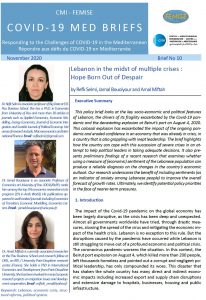The recent coronavirus crisis threatens the health, economies and societies of all countries. In Southern and Eastern Mediterranean countries, the fight against the pandemic is even more complicated. Cooperation and EU-Med strategies in key sectors are needed. Therefore, the Center for Mediterranean Integration (CMI) and FEMISE join forces and launch their joint series of Policy Briefs called “COVID-19 MED BRIEFS” to pave the way for thematic analyses and policy relevant recommendations.
The tenth COVID-19 MED BRIEF, entitled “Lebanon in the midst of multiple crises: Hope Born Out of Despair” by Refk Selmi, Jamal Bouoiyour and Amal Miftah is available here
 Summary: This policy brief looks at the key socio-economic and political features of Lebanon, the drivers of its fragility exacerbated by the Covid-19 pandemic and the devastating explosion at Beirut’s port on August 4, 2020. This colossal explosion has exacerbated the impact of the ongoing pandemic and eroded confidence in an economy that was already in crisis, in a country that is also grappling with inept leadership.
Summary: This policy brief looks at the key socio-economic and political features of Lebanon, the drivers of its fragility exacerbated by the Covid-19 pandemic and the devastating explosion at Beirut’s port on August 4, 2020. This colossal explosion has exacerbated the impact of the ongoing pandemic and eroded confidence in an economy that was already in crisis, in a country that is also grappling with inept leadership.
The brief highlights how the country can cope with this succession of severe crises in an attempt to help political leaders in taking adequate decisions. It also presents preliminary findings of a recent research that examines whether using a measure of (economic) sentiment of the Lebanese population can produce a reliable diagnosis on the changes in the country’s economic outlook. Our research underscores the benefit of including sentiments (as an indicator of anxiety among Lebanese people) to improve the overall forecast of growth rates. Ultimately, we identify potential policy priorities in the face of nearer-term pressures.
This Policy Brief is produced as part of the series of Policy Briefs on « Responding to the Challenges of COVID-19 in the Mediterranean » that is undertaken in partnership between FEMISE and the Center for Mediterranean Integration (CMI).
The views expressed in this Brief are those of the authors and do not reflect the views of CMI or FEMISE. The contents have not been subjected to verification by CMI or FEMISE and their publication does not reflect ownership by CMI or FEMISE.



